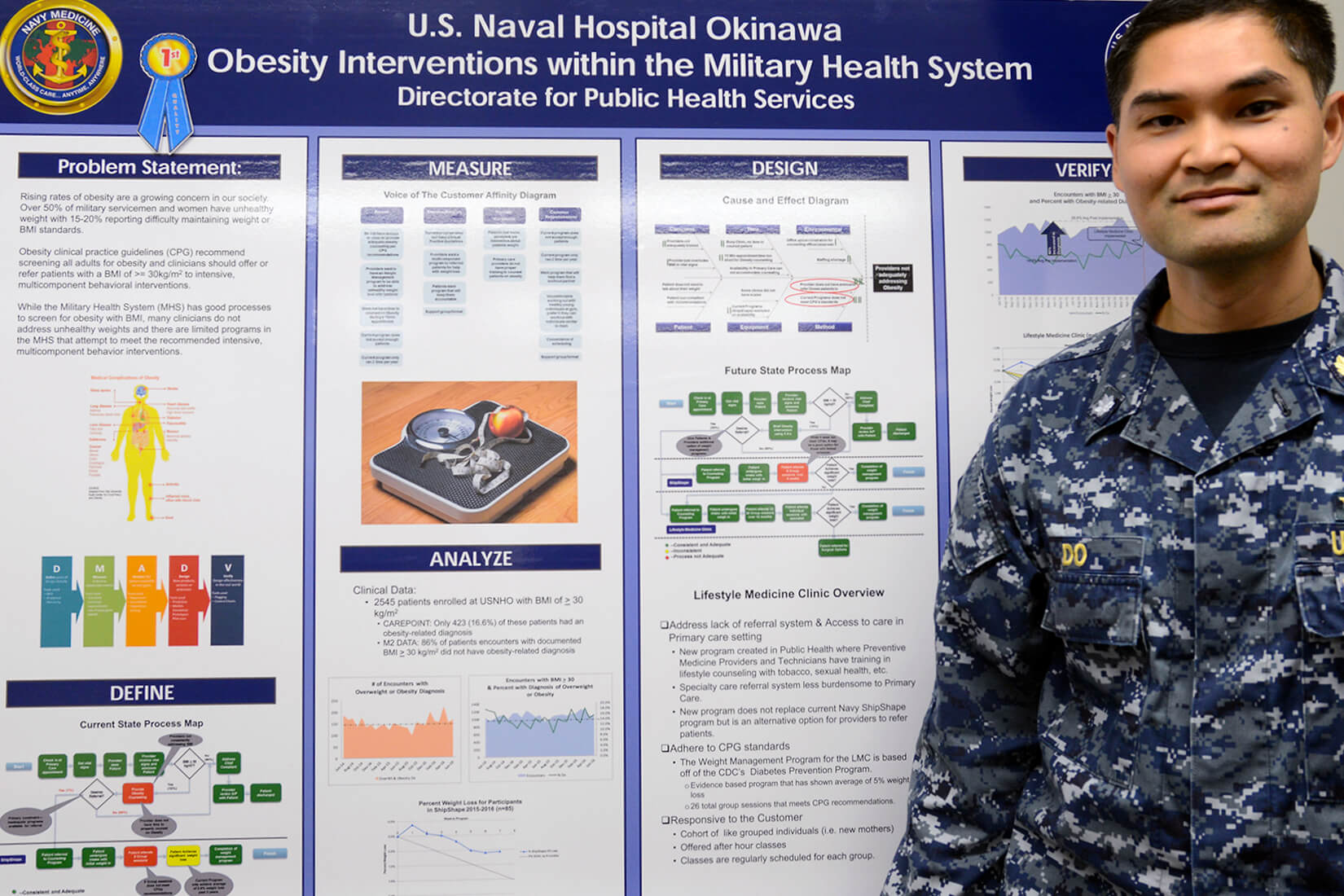
Navy photo by Mass Communications Specialist 3rd Class Kelly Agee
FALLS CHURCH, VA — This spring, DoD took direct steps to counter a significant impediment to mission readiness—excessive weight among servicemembers. Starting in May, TRICARE will cover the use of weight loss drugs for beneficiaries.
“Increased readiness, a component of the Military Health Service Quadruple Aim, entails ensuring that the total military force is medically ready to deploy,” said Defense Health Agency (DHA) spokesperson Kevin Dwyer. “Excessive weight and body fat have been associated with diminished military operational effectiveness, acute adverse health events and chronic diseases.”
The approved medications include the generic drugs phentermine, benzphetamine, diethylpropion and phendimetrazine IR and SR, which DHA added to the Uniform Formulary. The approved, nonformulary medications are liraglutide, lorcaserin IR/ER, naltrexone SR/bupropion SR, orlistat, phentermine/topiramate ER and phentermine 8 mg.
In keeping with the U.S. Food and Drug indications for these agents, DHA covers use of the drugs in patients with a body mass index above 29 or above 26 for individuals with obesity-associated comorbidities such as diabetes, impaired glucose tolerance, dyslipidemia, hypertension or sleep apnea.
DHA approved use of the weight loss drugs “to expand the options available to both patients and providers for cases where medicinal intervention is deemed appropriate,” Dwyer told U.S. Medicine. “Based on provider feedback, the expectation is that providers will find it beneficial to have these tools available to them, be they generic or newer medications.”
The DoD has previously relied on diet and exercise programs to help servicemembers lose weight and improve their health, but a continued uptick in the number of active duty personnel classified as overweight or obese indicates more help may be needed. The Health Care Survey of DoD Beneficiaries found that the prevalence of obesity increased from 13% to 16% among active duty service members and rose from 21% to 23% among all eligible adult beneficiaries, he noted.
“On average, people who take prescription medications as part of a lifestyle program lose between 3% and 9% more of their starting body weight than people in a lifestyle program who do not take medication,” according to the National Institute of Diabetes and Digestive and Kidney Diseases. The DoD Pharmacy and Therapeutics Committee recommendations for the weight loss agents further observed that in placebo-controlled trials of the drugs, 33% to 75% of patients taking a weight loss drug achieved a 5% reduction from baseline weight, compared to 25% of those taking a placebo. The trials included variable lifestyle interventions as well.
Even a modest reduction in weight of 5% to 10% can decrease the risk of chronic diseases related to obesity and improve blood pressure, cholesterol and glucose levels, according to the national Centers for Disease Control and Prevention. For military personnel, the benefits might be greater, Dwyer noted.
“Research suggests an association between elevated BMI levels with lower fitness and increased risk of pain, injury disability and premature retirement or discharge among military personnel. Obese individuals are also at significantly higher risk of heat-related illnesses at any given workload or environmental temperature,” he said. “In addition, as the chronicity of a condition such as musculoskeletal injury increases over time, predicted recovery and return to full duty decreases, which also has a significant detrimental impact on unit readiness.”
Prior Authorization
All the weight loss medications require manual prior authorization. The criteria for approval for adults include participation in a “trial of behavioral modification and dietary restriction for at least six months” and continued engagement in a diet and exercise program while being treated with weight loss medications. Active-duty servicemembers must be enrolled in their service’s health and wellness program and follow its policies. The drugs are not approved for use in pregnant women.
DHA recognizes “there is no single agent that is appropriate for all servicemembers. Each has unique profiles and effects that any physician will consider when selecting an agent,” Dwyer said.
While flexible in some ways on the use of the approved drugs, the agency requires a three-month trial of phentermine, unless contraindicated, before approval of any branded weight loss medication. If the patient does not lose 5% of baseline weight with phentermine, and meets other criteria, a branded weight loss medication prescription may be approved. Servicemembers with impaired glucose tolerance or diabetes must try metformin first.
The agency also instituted a hierarchy of preference within the branded drugs. Physicians may prescribe either lorcaserin, naltrexone/bupropion or phentermine/topiramate, after trying phentermine. Trials of all three preferred branded drugs must be completed, if not contraindicated, before DHA will approve use of orlistat. The three preferred branded medications and orlistat must be tried before liraglutide will be authorized.
When choosing among the available medications, “pharmaceutical decisionmaking for any patient—to include an individual service member—is based on an evaluation of specific history and clinical issues that are unique to that patient and medical decision making involved as part of that assessment. Essentially and quite simply, it is a decision that is reached as a result of a physician’s evaluation, tailored specifically to each individual patient,” Dwyer emphasized.
How long a servicemember stays on a medication will depend on their results and their service’s policy. DHA’s prior authorization rules for the generics require reauthorization after three months and for the branded drugs after four months. Authorization renewal may be granted if the patient has lost at least 5% of baseline body weight and continues to be engaged in the service’s health and wellness program.
The Air Force issued new policies concerning the use of weight control drugs and surgery in February that reflect the change in DHA policy but with stricter guidelines. The policy notes that “weight control medication is not approved for routine use in overweight active duty members,” however, “short term use (typically less than three to six months) of weight control medication may be considered in carefully selected obese patients.”
The Air Force expects weight loss medication to be used along with behavioral modification, monthly provider visits, dietary counseling and regular aerobic exercise. Certain drugs may cause changes in flying status or deployability. Other services also are in the process of updating their policies.

